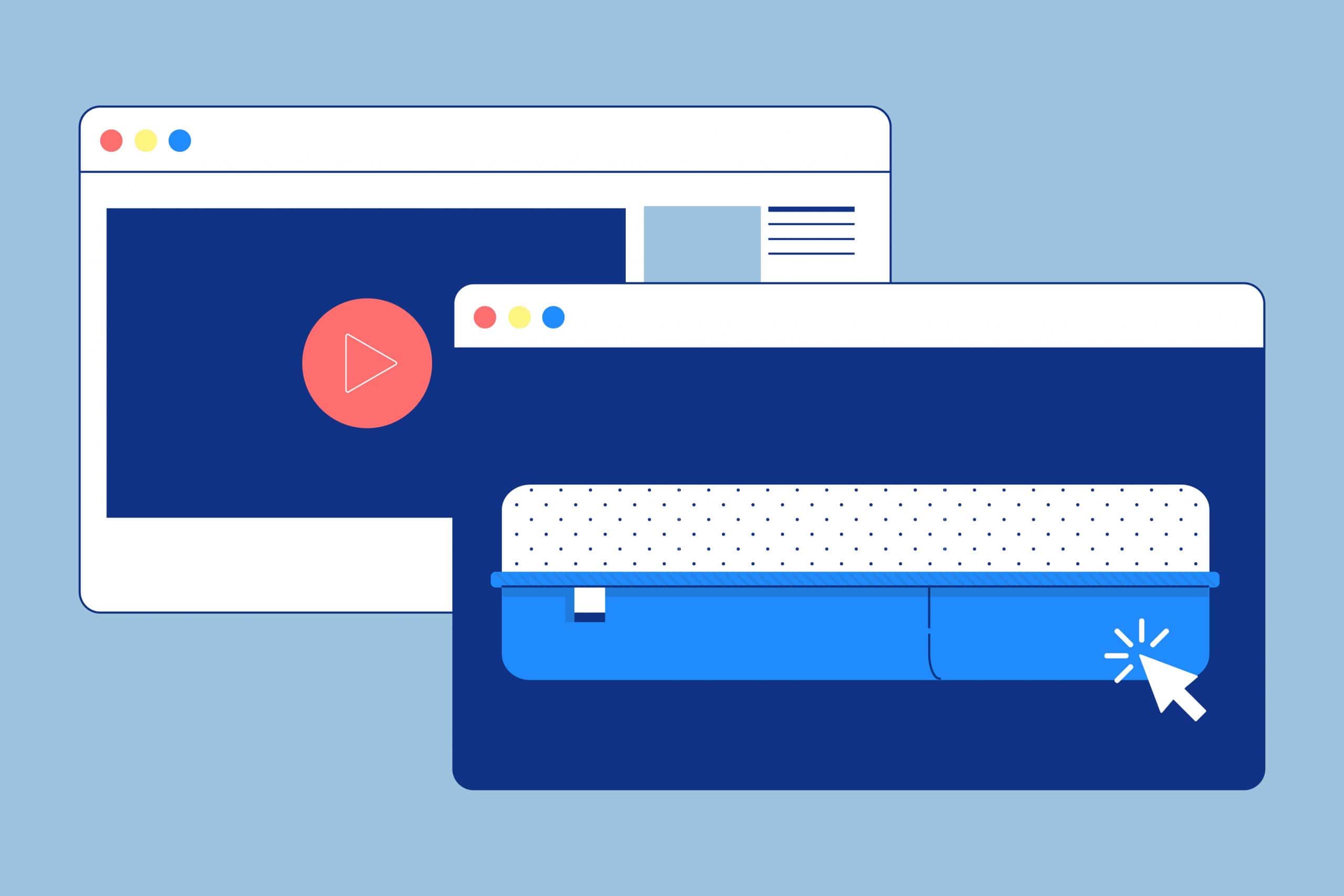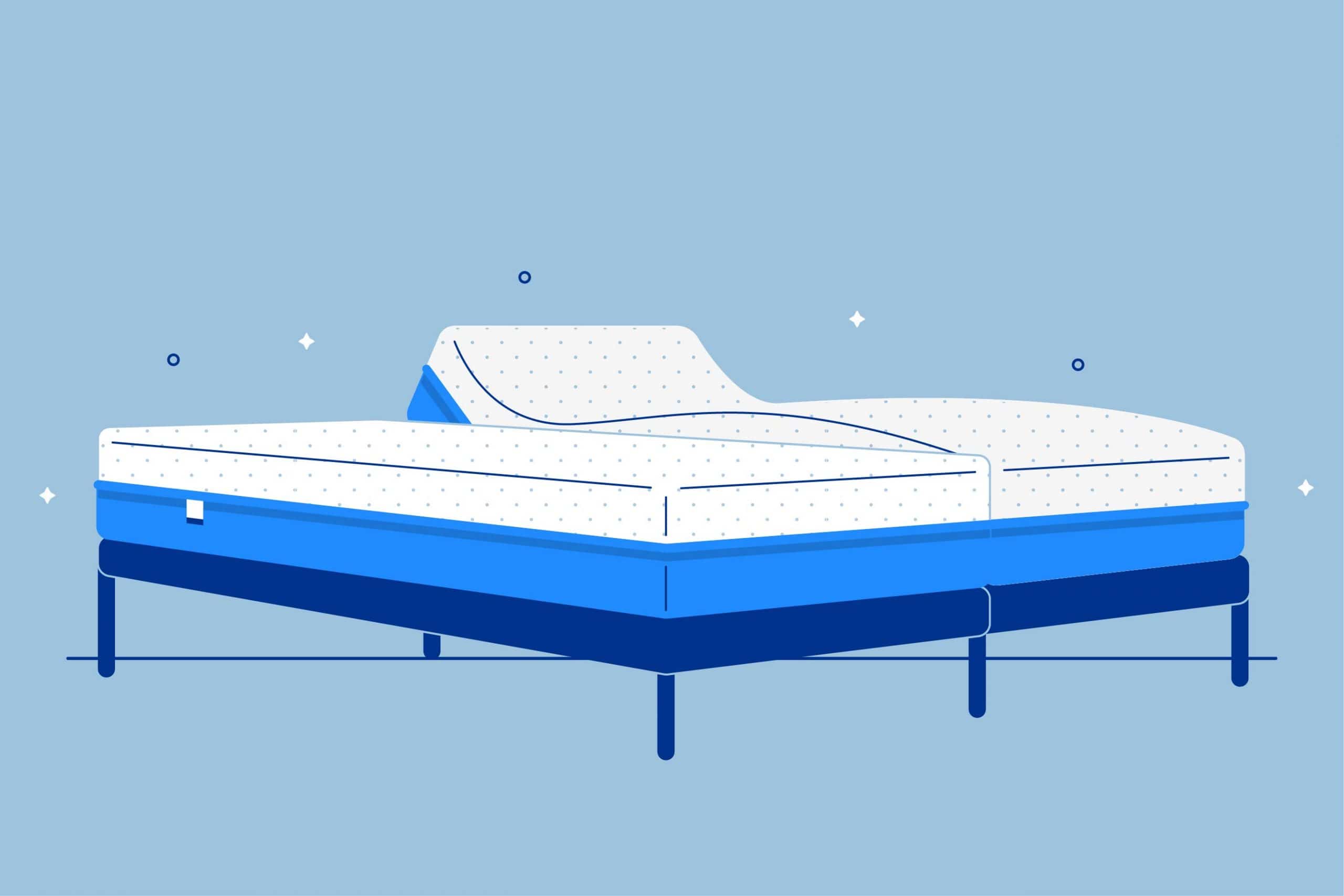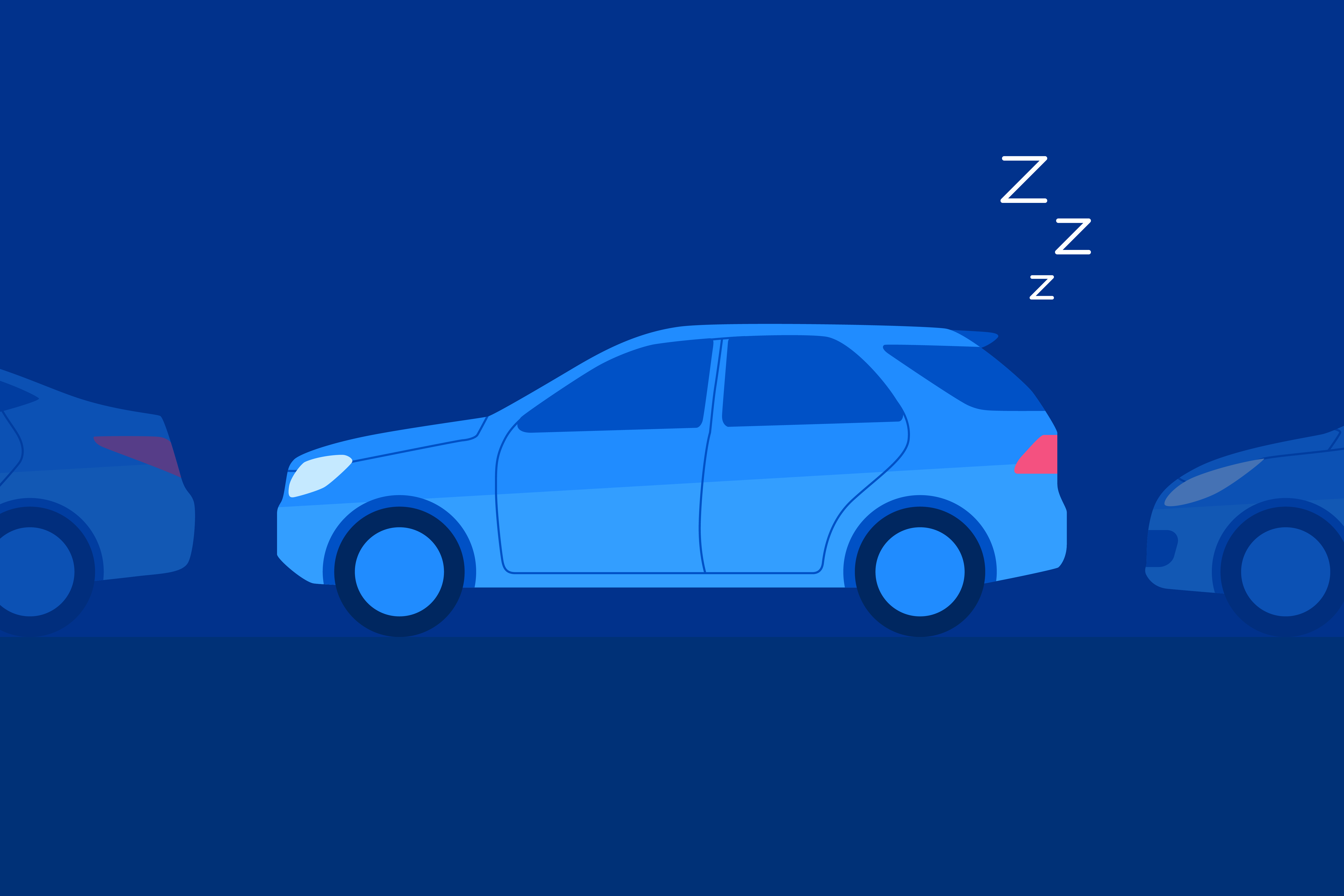Key Takeaways
- Increased Productivity: Early risers tend to report higher productivity levels compared to late risers, with those waking up as early as 4 a.m. being the most productive.
- Earning Greater Incomes: Early risers tend to earn more on average annually compared to those who wake up later, with those waking up at 4 a.m. reporting the highest average income.
- Why Rise in the Early Morning: Early risers often attribute their habit to a sense of not wanting to waste their mornings, having too much to do, or simply enjoying waking up early.
When your alarm goes off each morning, is your first instinct to smash the snooze button or hop out of bed? Early risers are somewhat of an enigma to those who are not as eager to face the world after a night of rest. We decided to survey both early and late risers about the perks of getting up early and how hitting “snooze” affects those who’d rather not climb out of bed right away in the morning.
We compared productivity levels, health, relaxation, and satisfaction. Let’s take a look at what shapes morning people and how it affects the rest of their days.
Setting That Alarm
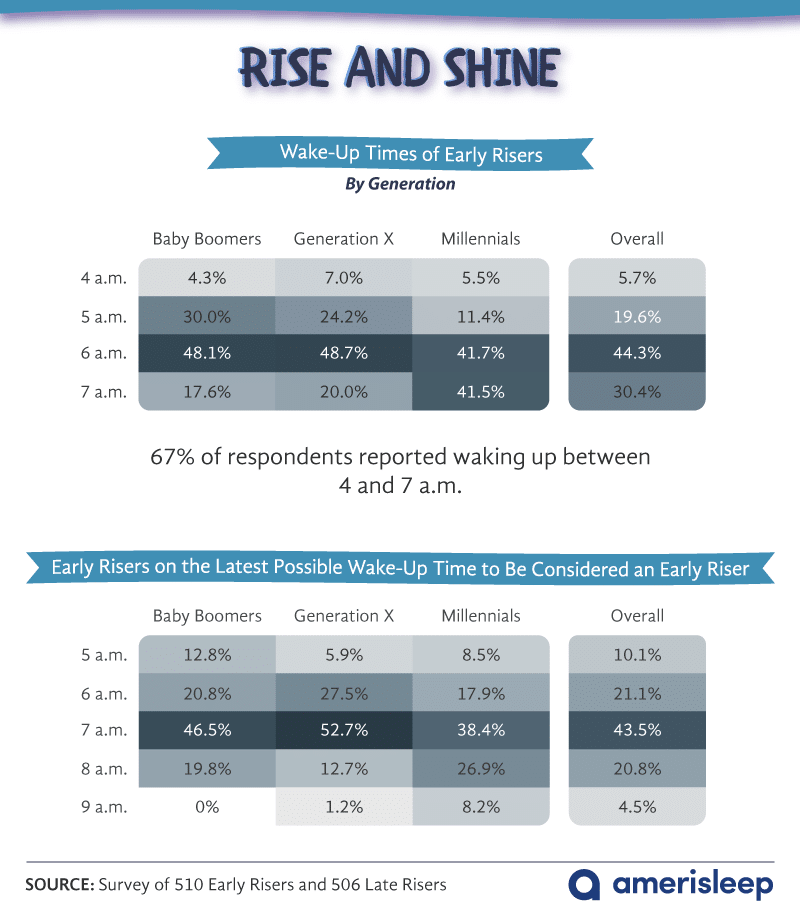
First, we looked at when early risers actually get up in the morning. Some woke up at 4 a.m., but according to our survey, those folks were few and far between regardless of age. More early risers got up at 5 a.m., but this was more common in baby boomers.
By far, the most popular time to get up for morning people was 6 a.m., with baby boomers, Gen Xers, and millennials all choosing this selection at least 40 percent of the time. Fewer got up at 7 a.m., particularly the two older generations, but millennials were just as likely to get up at 7 as they were at 6 a.m.
We then asked our respondents about the latest possible wake-up times to be considered an early riser. The largest percentages across all generations selected 7 a.m. The two older generations were less likely to consider people who got up at 8 a.m. as early risers, and baby boomers thought no one who got up at or after 9 a.m. could call themselves an early riser. Around 8 percent of millennials, however, thought those waking up at 9 a.m. would still be considered early risers.
Why Did You Become a Morning Person?
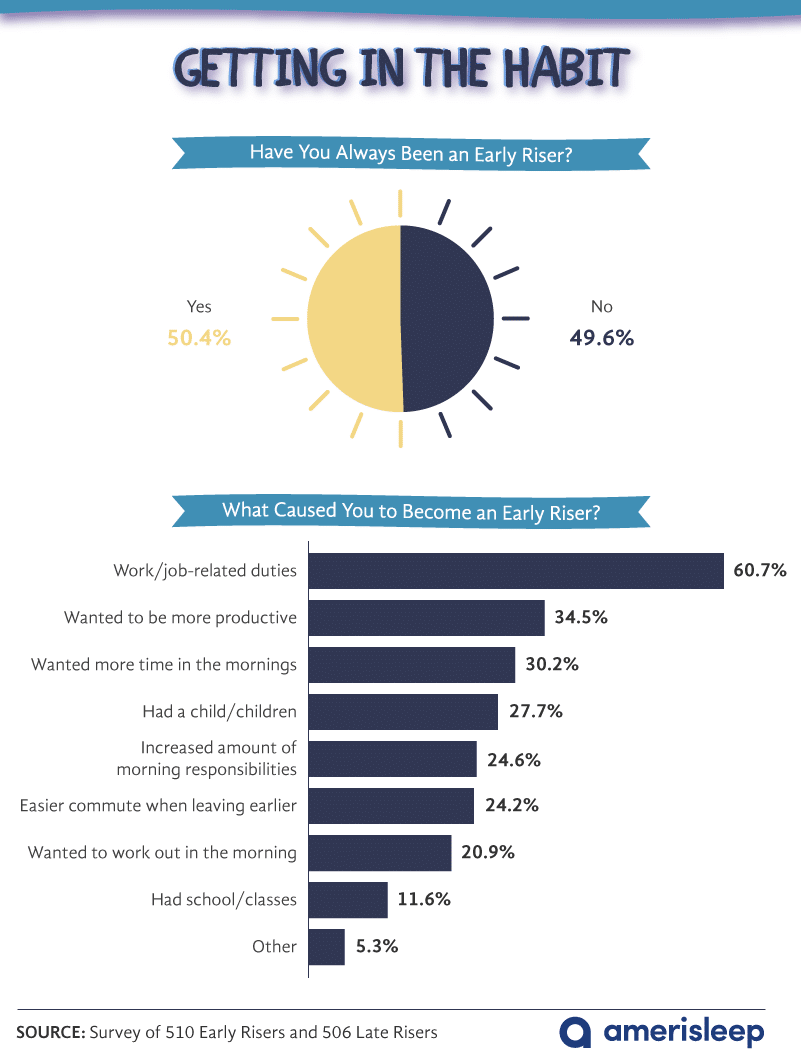
Next, we wanted to learn how morning people got into the habit of waking up early. Over 50 percent confirmed they had always been early risers.
Most of our respondents said it was because of work, which makes sense as many places of employment operate on a traditional schedule where employees have to report to work anywhere from 7 to 9 a.m.
There were other reasons aside from work, though. Over 34 percent said they wanted to be more productive, 30 percent said they wanted more time in the mornings, and almost 28 percent said having a child got them in the habit of waking early. Others cited they had an easier commute when they left earlier in the morning, and almost 21 percent said they wished to work out in the morning.
Primed for Productivity
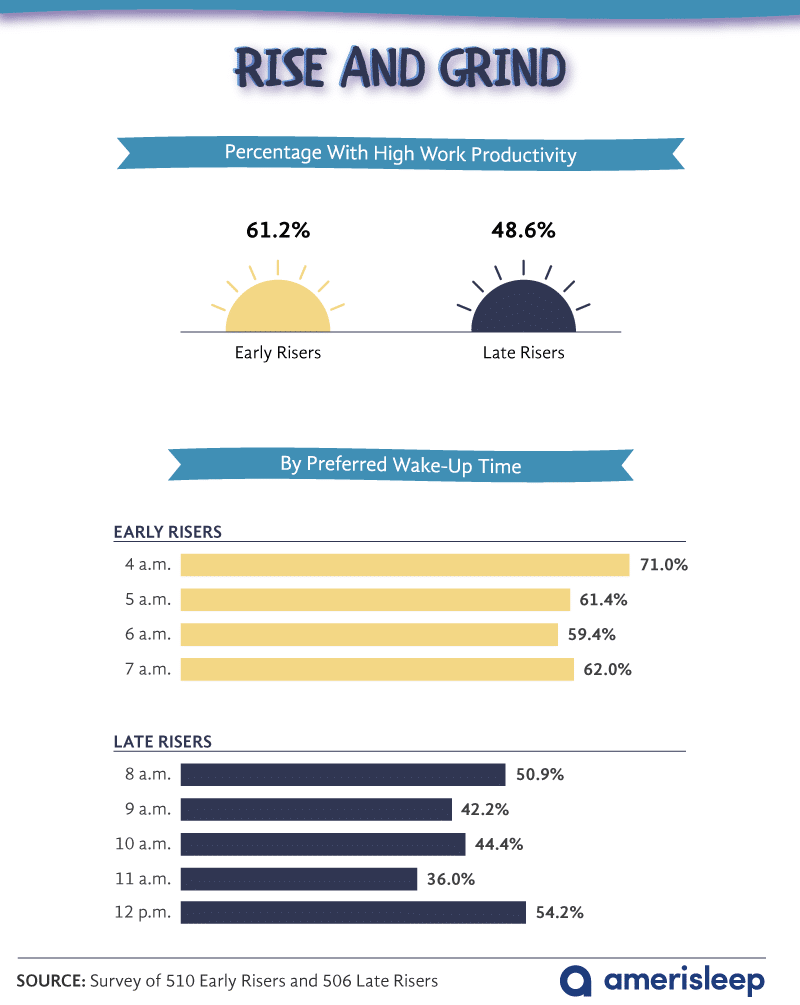
The 34.5 percent of respondents who mentioned waking up early to increase their productivity were onto something: Early risers were significantly more likely to be productive that day. Less than half of late risers (48.6 percent) labeled themselves highly productive, compared to 61.2 percent of those who woke up by 7 a.m.
The most extreme wake-up time yielded the more intensely productive respondents. Those who managed to get out of bed at 4 a.m. –before the sun typically comes up – were highly productive 71 percent of the time. This rousing hour yielded more productive respondents than any other time cited in our survey. The absolutely least productive days were started at 11 a.m., with only 36 percent of these late risers finding high productivity levels in the ensuing day. With so many morning hours being slept through, there simply may not be enough hours in the day left for this group to be productive.
Money Mornings
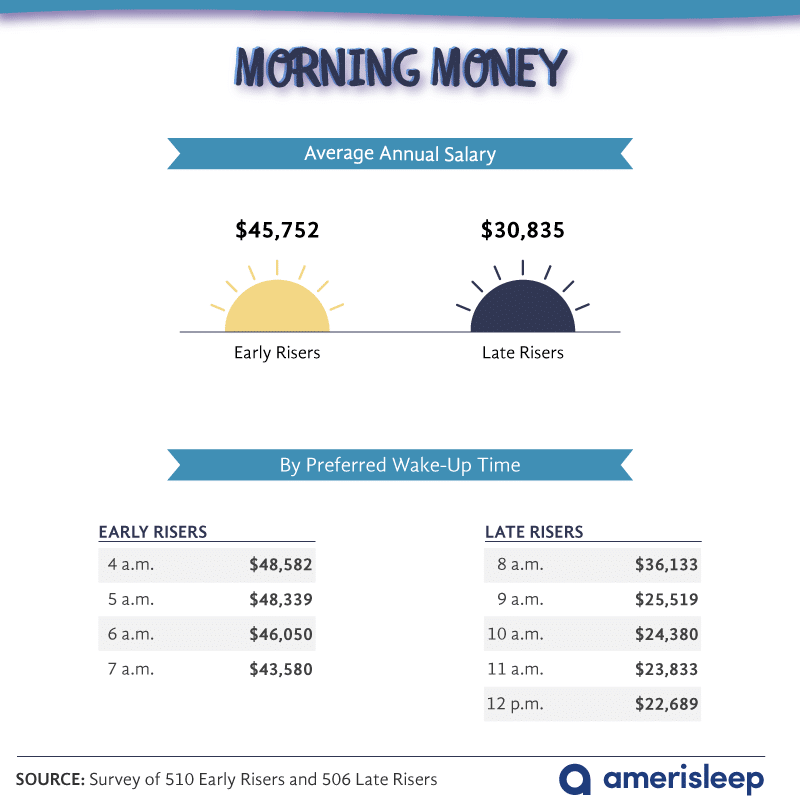
As it turns out, the early morning/higher productivity correlation may be motivated by more than an innate desire to get up and go: Money earned appeared directly impacted by wake-up times. Early risers earned an average of $14,917 more every year than those who slept in. Again, the aforementioned 4 a.m. wake-up reigned supreme with the absolute highest average income. On average, 4 a.m. risers earned $48,582 per year. On the opposite end of the spectrum, the lowest earners didn’t get out of bed until noon, and they earned just $22,689 annually. In fact, all those who rose at 9 a.m. or later earned incomes that fell below the official poverty line for a family of four in the U.S.
Morning Habits
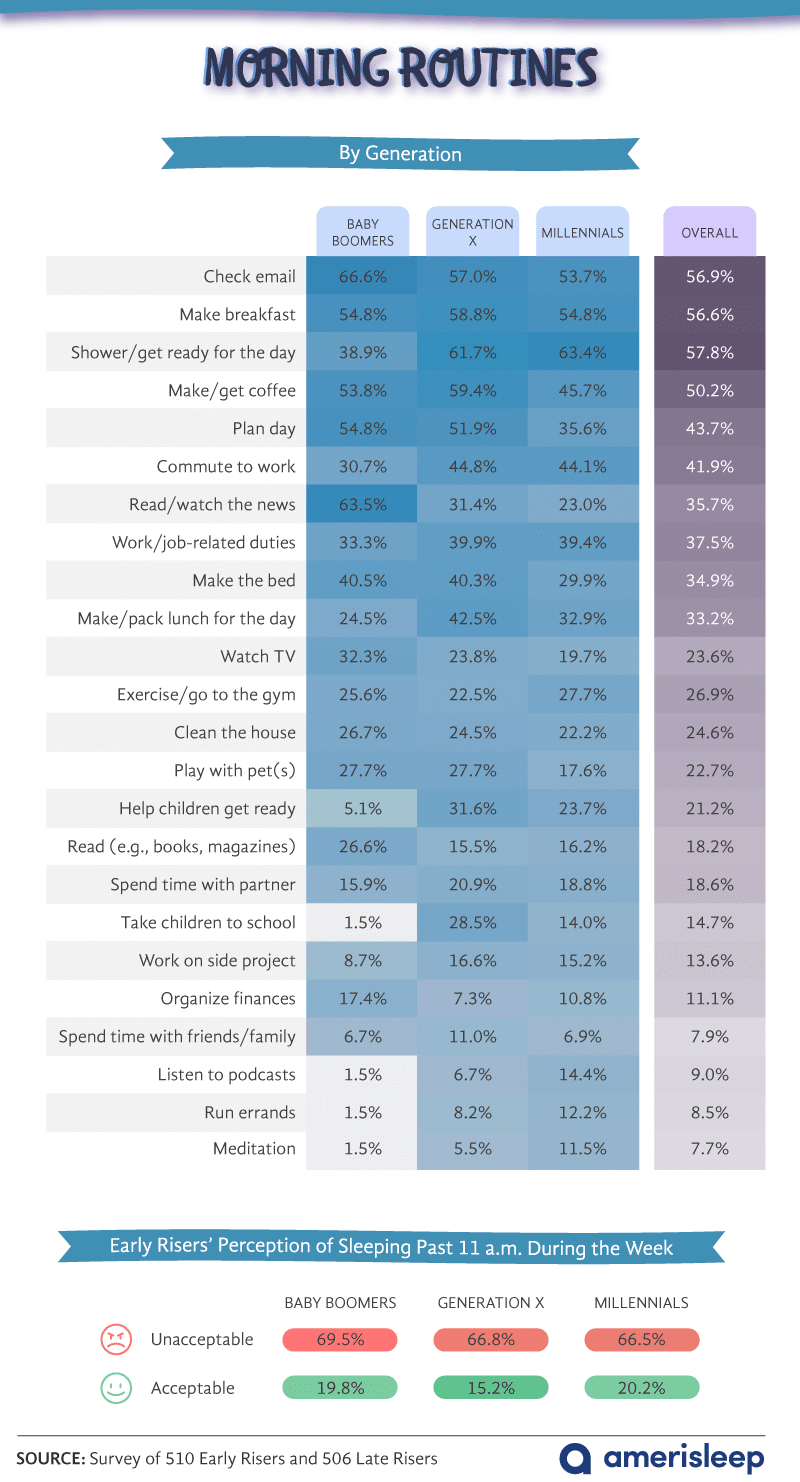
Here, we wanted to delve a little deeper into the morning habits of our survey respondents.
Baby boomers were less likely to shower and get ready for the day than either Gen Xers or millennials, probably because many baby boomers are at or past retirement age and have no direct need to get ready for work in the mornings. Also, baby boomers were less likely to help children get ready in the mornings, probably because their kids have grown up.
However, baby boomers were far more likely to read or watch the news than the other generations. This may be due to the progression of digital news and how both Gen Xers and millennials may be more likely to get information on their phones or computers than by newspapers or TV.
We also asked what morning people thought of people sleeping past 11 a.m. during a normal workweek. Across all generations, the majority perceived this behavior as unacceptable, with baby boomers leading the way. Millennials were the most accepting group with 20.2% deeming it okay.
Quality of Life
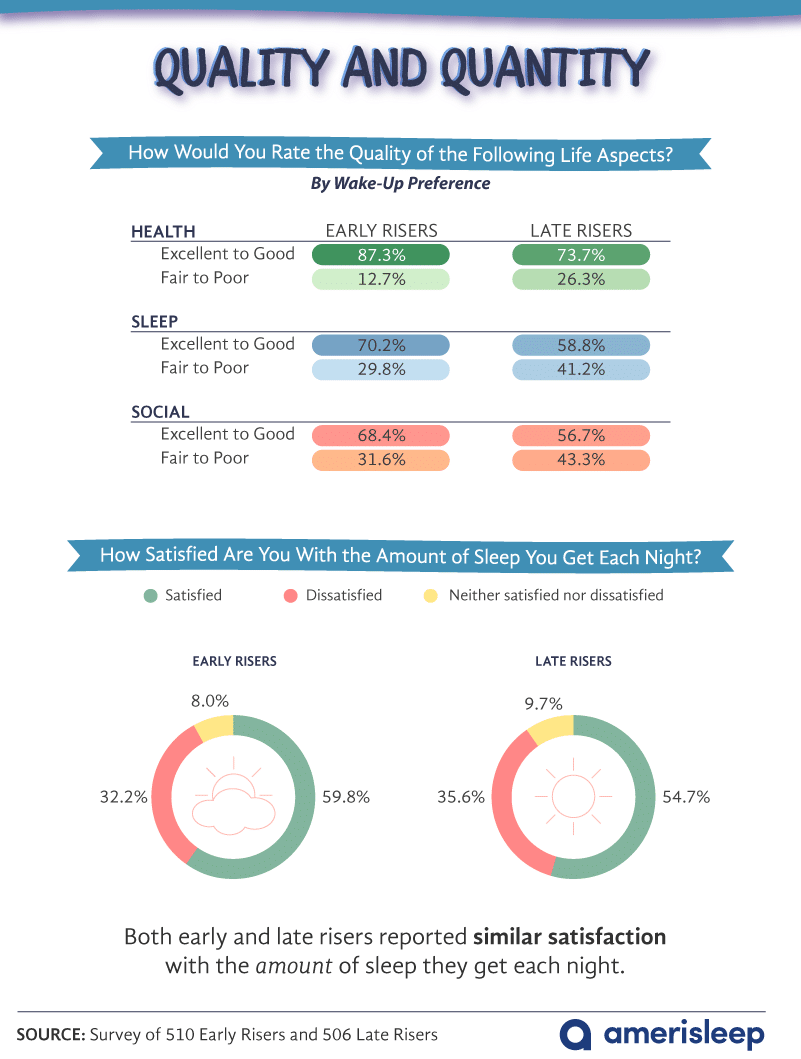
We asked our respondents how they’d rate their quality of health, sleep, and social life. As it turns out, those who got up early felt better about all three aspects than those who slept in. A recent study looked at individuals’ preferred hours of sleep and how it related to depression, and they found that getting more daylight might benefit one’s mental health (specifically, waking up earlier was associated with less depression in women).
We also asked both types of people if they were satisfied with their amount of sleep. Both early and late risers had very similar answers. Early risers were slightly more satisfied with their amount of sleep, but only by about 5 percentage points.
Weekend Edition
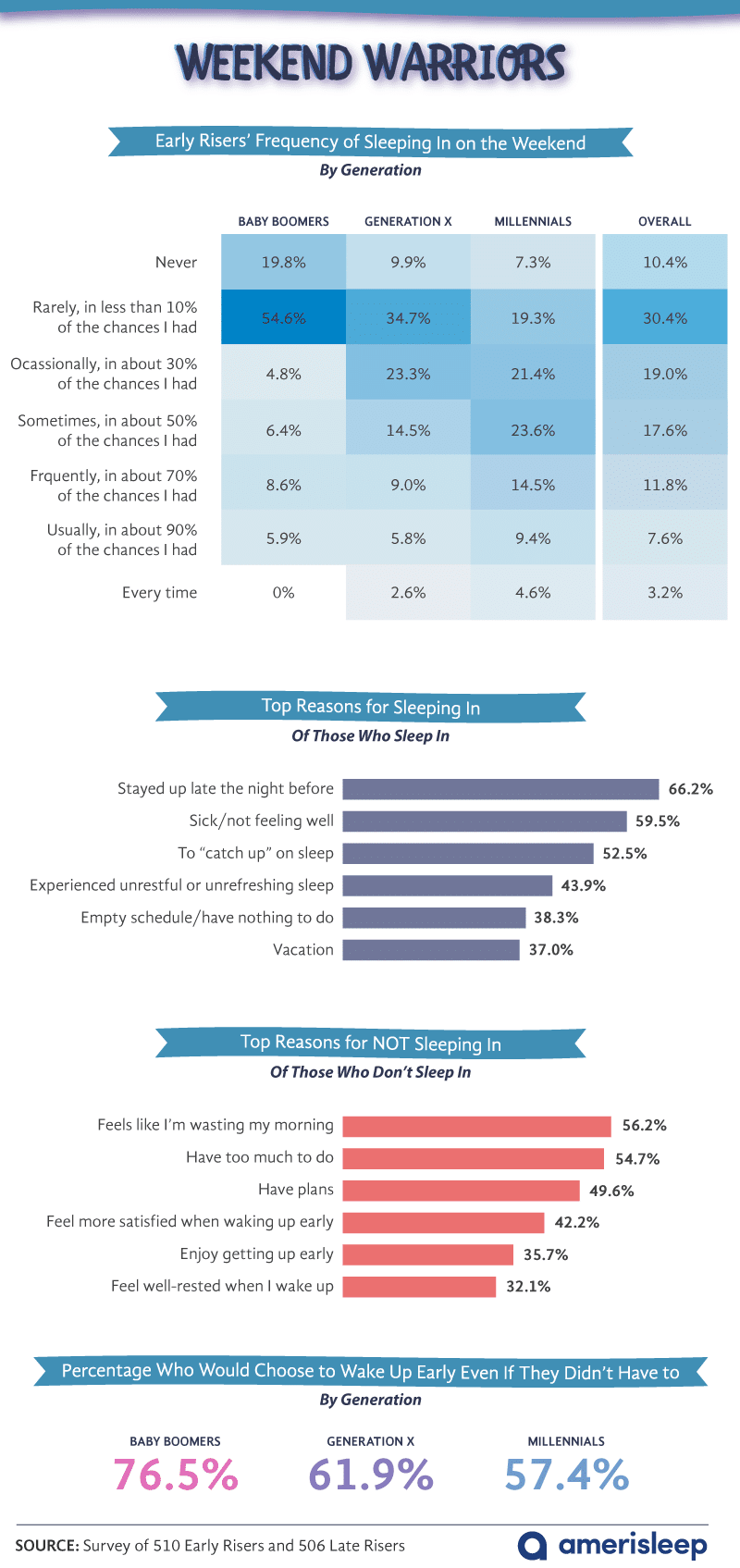
Finally, we wanted to know what morning people did on the weekend. Do they set their alarms, or do they prefer to sleep in when they can? Baby boomers were the least likely to sleep in on the weekend – over half said it was rare and only happened in less than 10 percent of the chances they had. No baby boomers said they slept in every chance they got, and when it did happen, it was extremely infrequent.
The younger generations were more likely to sleep in, but still, very few made a serious habit of it – 2.6 percent of Gen Xers said they slept in every weekend, and 4.6 percent of millennials said the same. Millennials were, however, more apt to sleep in when they had a chance to do so, with 23.6 percent saying they did it about 50 percent of the chances they had. Overall, nearly 60 percent of respondents said they slept in 30 percent of the time or less often.
The top reason for rising early was because it felt like they were wasting their mornings (56.2 percent). Other common reasons for waking up early included having too much to do (54.7 percent), having plans (49.6 percent), and feeling more satisfied when waking early (42.2 percent). Some people said they did it solely because they enjoyed waking up early (35.7 percent).
The Early Bird Gets the Worm
While most early and late risers felt they get enough sleep, there were a few differences, namely in how they perceived their quality of health, sleep, and social lives. It’s interesting to see the generational breakdown too, with a few distinctions based on where baby boomers are in their lives compared to the younger generations.
To help you get a good night’s sleep, make sure to check out Amerisleep for a selection of the best mattresses by sleeping position. Using more technology linked to improved sleep than any other brand, our proprietary fabric and materials will help you unwind and settle in for a night of comfort. Try our mattresses risk-free for 100 nights. We don’t think it’ll take you long to notice better zzz’s, though. Visit us at Amerisleep.
Methodology
We ran two surveys to collect the project data. The early riser survey collected responses from 510 people using Amazon’s Mechanical Turk. 50.8% of participants were female, and 49.2% were male. Participants ranged in age from 18 to 73 with a mean of 36.7 and a standard deviation of 10.5. Early risers were qualified as those who woke between 3 and 7 a.m. The late riser survey collected responses from 506 people and also used Amazon’s Mechanical Turk. 57.7% of participants were female, and 42.3% were male. Participants ranged in age from 18 to 77 with a mean of 35.3 and a standard deviation of 11.9. Later risers were those who woke at any time of day that wasn’t between 3 and 7 a.m. Participants were excluded if they were clearly not paying attention (failed an attention-check question or entered obviously inconsistent data). Only times with an adequate sample size (greater than or equal to 26 respondents) were included in the project. Data were weighted to the 2017 BLS data for the gender and age of Americans. Statistical testing was not performed.
Respondents were asked how acceptable they believed it is to sleep past 11 a.m. during the week. They were given the following options:
- Totally unacceptable
- Unacceptable
- Slightly unacceptable
- Neutral
- Slightly acceptable
- Acceptable
- Perfectly acceptable
These were then consolidated into three groups in the final project: acceptable, unacceptable, and neutral. Only acceptable and unacceptable responses were visualized in the final project.
Respondents were asked how they would rate the quality of the following aspects of their life: health, sleep, and social life. They were given the following options:
- Poor
- Fair
- Good
- Very good
- Excellent
These were then consolidated into two groups in the final project: poor to fair and good to excellent.
The data presented here are based on self-reporting. Self-reported studies may be affected by the person’s feelings at the time they filled out the questionnaire. Respondents may also exaggerate symptoms or forget pertinent details.
Sources
- https://www.cdc.gov/sleep/about_sleep/how_much_sleep.html Verified Source Centers for Disease Control and Prevention (CDC) The United States’ health protection agency that defends against dangers to health and safety. View source
- http://www.journalism.org/2016/07/07/pathways-to-news/
- https://www.sciencedirect.com/science/article/abs/pii/S0022395617311652 Verified Source ScienceDirect One of the largest hubs for research studies and has published over 12 million different trusted resources. View source
Fair Use Statement
Hey, sleepyhead! Whether you’re a morning person, you may feel the need to share our findings with your readers. If so, you’re free to share on any non-commercial website, but don’t hit “snooze” and forget to link back to this page.
About the author
McKenzie Hyde is a Certified Sleep Science Coach and a full-time writer specializing in sleep health and the mattress industry. With a Master of Arts degree in literature and writing from Utah State University, McKenzie combines her passion for writing with her in-depth knowledge of sleep science. Her articles cover a wide range of topics, including best sleep practices for students, the consequences of sleep deprivation, and choosing the right mattress for back pain relief. McKenzie's dedication to delivering accurate and informative content makes her a valuable contributor to the field of sleep health.
View all posts


